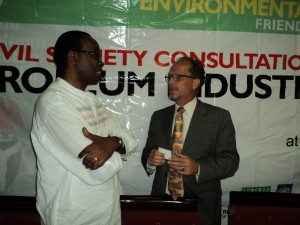Civil society organisations (CSOs) and environmental experts last week in Abuja attempted a review of the controversial draft Petroleum Industry Bill (PIB), in the bid to ensure that provisions relating to environmental and livelihoods protection serve the desired purpose.

Organised by Environmental Rights Action/Friends of the Earth Nigeria (ERA/FoEN) and the United Nations Development Programme (UNDP), the daylong forum likewise examined CSO engagement in the legislative process towards the passage of the PIB.
After several months of confusion, the executive through the Petroleum Minister, Deziani Alison-Madueke, on July 18th, 2012, submitted what it called the final and authentic copy of the PIB to the National Assembly. The bill was described as the most anticipated draft legislation in Nigeria’s legislative history.
The PIB was originally submitted in 2008 during the 6th National Assembly by former President Shehu Musa Yar’ Adua. It was however not passed because of the many controversies surrounding its provisions and content.
With the commencement of the 7th National Assembly, the PIB was resuscitated. In response to public pressure, the government set up a committee to draft a new draft bill that the Executive will present before the National Assembly.
A reading of the new version of the PIB, however, shows a drastic fall in standards in comparison to previous versions, according to stakeholders, who stress that the new draft bill is being viewed with suspicion due to the lack of adequate consultation in the drafting process.
According to them, a critical look at the document is imperative as the National Assembly reconvenes this month.
Executive Director of ERA/FoEN, Nnimmo Bassey, said that the PIB ought to be predicated on the premise that the petroleum resources sector is a highly polluting sector. He added that the bill should also have the clear understanding that the resources are non-renewable and are thus finite.
“As they will either be exhausted or may simply fall out of use, this demands utmost care to ensure socially and environmentally acceptable practices,” the activist noted.
According to him, oil spills and gas flares should be dealt with as environmental security matters and clear powers to regulate and control activities, punish violators and restore the environment should be identified – and such should be vested on the Ministry of Environment and not on the Petroleum Resources Ministry.
“The minister in charge of the petroleum sector should not regulate a sector in which they active polluters,” Bassey declared, stating that gas flaring is already illegal in Nigeria (since 1984 and confirmed by a High Court decision in 2005), and that “the PIB should not legalise illegality.”
“It is wasteful treatment of a resource and harms both the people and the local as well as global environment,” he remarked of gas flaring, saying that the PIB should make clear statements on the issue “to avoid the minister lowering the fine to below commercial value.”
“Indeed, the punishment for gas flaring should not be limited to fines but should have weightier consequences considering its criminal nature.”
A legal practitioner, Nurudeen Ogbara, pointed out that the bill does not adequately involve or otherwise empower the people of the oil-bearing communities in the ownership, control and management of the oil and allied resources, particularly given the reality and potency of the international right to development.
“It is submitted, with due respect, that this is tokenistic and does not commensurate with what should be put in place for the people because what is good for the goose is good for the gander too. In any case, the way and manner the Fund is to be administered to ensure the development of the social and economic infrastructures of oil-bearing communities is amorphous and not obvious, clear-cut or transparent as to engender the needed benefits to the affected communities and their wishes,” he submitted.
Deputy Director, United Nations Development Programme (UNDP) Country Office, Jan Thomas Hiemstra, said the objective of the meeting is to further strengthen strategic engagements of civil society organisations in the process of governance.
“Against the background of the recently concluded Rio+ 20 summit, where the entire globe affirmed the urgent need to embrace sustainable development, it is very pertinent to have the issues of environment well integrated into mainstream policy making processes,” he said.
This, he added, would ensure transparency and accountability “that will build confidence and ensure successful performance of the bill.”
